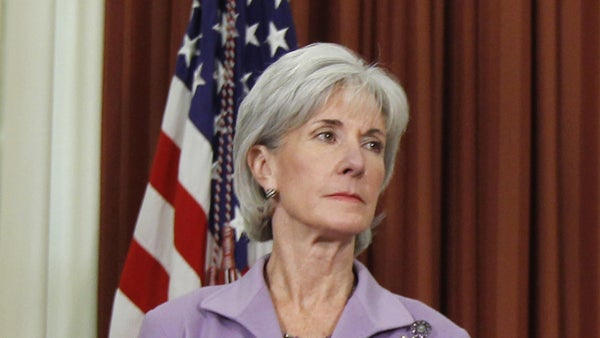Sebelius won’t intercede in local 10-year-old’s quest for transplant

Health and Human Services Secretary Kathleen Sebelius is shown in the Oval Office in this 2011 file photo. (AP Photo/Charles Dharapak, file)
The nation’s chief health administrator won’t intervene in the case of a 10-year-old Newtown Square with cystic fibrosis who is waiting for a lung transplant at Children’s Hospital of Philadelphia.
Kathleen Sebelius, Secretary of Health and Human Services, told a congressional committee on Tuesday that she can’t cherry-pick this one, high-profile case to intervene. She said that at CHOP alone there are three other children who are just as sick as Sarah Murnaghan.
Murnaghan has cystic fibrosis, a progressive disorder that affects mainly the lungs. Without a lung transplant, she will die. She’s been on a transplant list 18 months.
Her family wants her to be eligible to get an adult lung should one become available.
But national rules governing lung transplants give children under 12 lower priority than any waiting adults for any adult lung that might become available for transplant.
The Murnaghan family has called on Sebelius to suspend policies that deny their daughter a transplant based on her age.
“We aren’t asking for an exception to be made, we are asking for a suspension of current policy while the review that the Secretary requested is conducted,” U.S. Rep. Pat Meehan, who is the family’s congressman, said in a statement. “This will protect kids, including Sarah, who are being discriminated against by this arbitrary policy. As I outlined in a letter to the Secretary, she does indeed have the authority to intervene and suspend the policy. Sarah is not asking to be placed ahead of another, but rather for equitable treatment based on sound medical judgment and that she be accorded her appropriate place in line.”
Sebelius told the congressional committee that transplant policies for children need review, but that it would not be right for her suspend the rules for an individual case.
CHOP has not commented on the case, which has attracted national attention.
Dr. Scott Halpern, an assistant professor of medicine at the University of Pennsylvania, said he agrees with Sebelius’ decision, saying that transplant policies are well established.
“It would be wrong for policies to be changed in light of a single case,” he said. “Rather, we should use this devastating case to encourage scientific examination to use lung supply to benefit everyone, adults and children.”
Arthur Caplan, director of the Center of Medical Ethics at New York University and founder of Penn’s Center for Bioethcs, also said Sebelius’ stance was proper, but added that she didn’t go far enough in her call for reform.
He questioned the lack of any avenue to appeal these types of medical decisions.
“People think that the law would fall apart if we called them into question,” he said. “Even the IRS has an appeals process. People need that safety valve to turn when they want to question certain medical policies.”
WHYY is your source for fact-based, in-depth journalism and information. As a nonprofit organization, we rely on financial support from readers like you. Please give today.

